Kick-Off: Stop Bureaucracy – An Initiative to Strengthen Europe

On Thursday, October 17, SME Connect organized an energizing working breakfast at the European Parliament in Brussels, rallying strong interest and support from the business community for its member, the Taxpayers Association of Europe, and their ambitious “Stop Bureaucracy” campaign. This event, “Kick-Off: Stop Bureaucracy – An Initiative to Strengthen Europe” marked the launch of the association’s petition – a call to action demanding decisive and smart cuts to the EU’s sprawling bureaucracy. By curbing excessive red tape, this initiative aims to empower businesses, drive innovation, and reinforce the European Union as a guarantor of values and safety, demonstrating that these values must not exclude success, growth, and jobs. The event was hosted by ANGELIKA WINZIG MEP, Board Member of SME Connect.
The event commenced with a compelling opening from ANDREA WECHSLER MEP, who gave her full support to the Stop Bureaucracy Initiative and its mission of regulatory simplification. She emphasized that clear, streamlined regulations are essential for small and medium-sized enterprises to maintain flexibility, drive innovation, and stay competitive globally. Underscoring the importance of adaptability, she affirmed that empowering SMEs through smarter policies is vital for their continued growth and success. Wechsler further stressed that while smart regulation is necessary, unnecessary burdens must be avoided to ensure that SMEs can operate without constraints that hinder their potential.
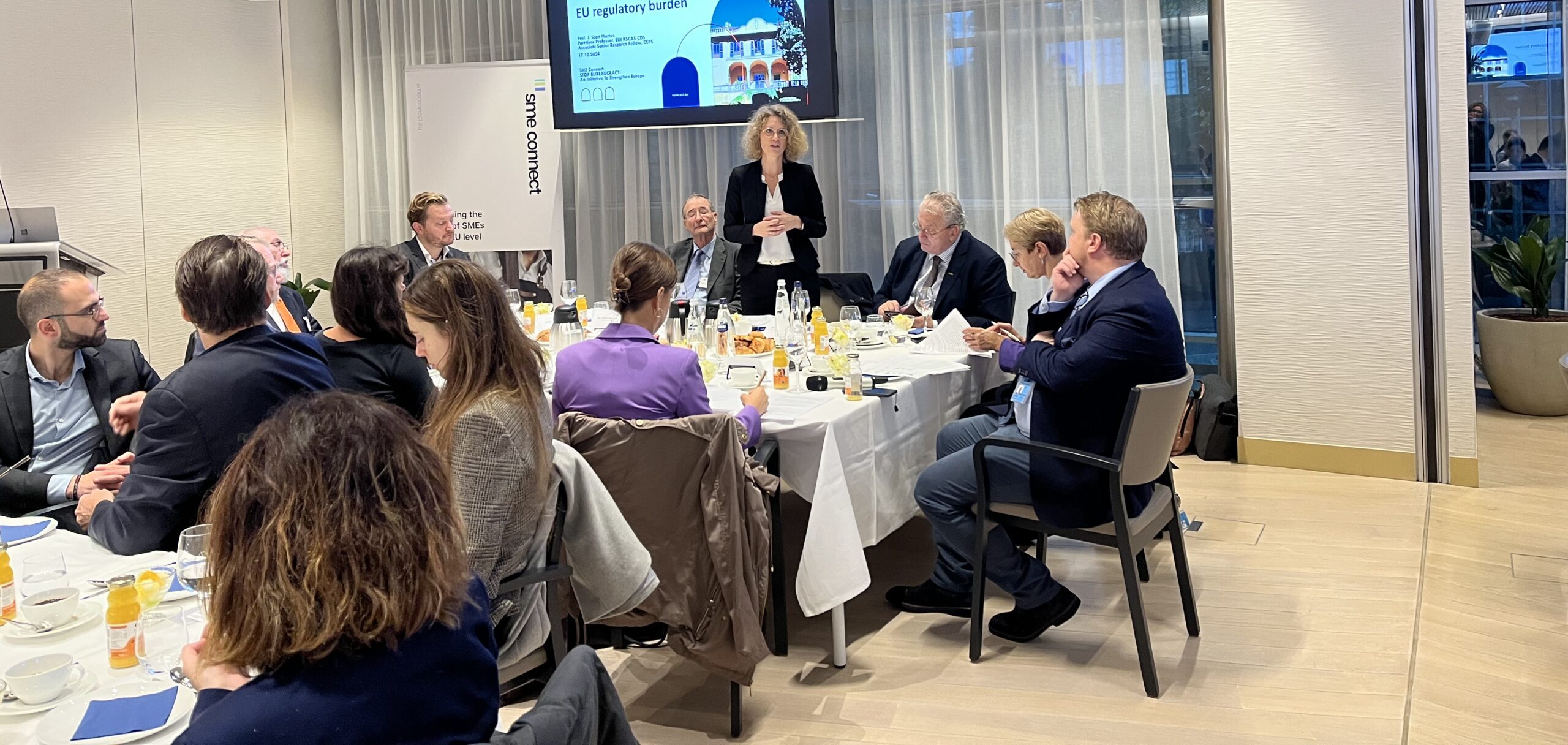
The event was led by the key initiators CHRISTOPH LEITL, President of the European Business Circle, former President of the Austrian Chambers of Commerce and Eurochambres, and MICHAEL JÄGER, President of the Taxpayers Association of Europe.
CHRISTOPH LEITL stated that Bureaucracy is one of the greatest barriers to Europe’s economic success. It burdens small businesses and entrepreneurs, drowning them in paperwork rather than allowing them to focus on innovation and growth. Bureaucracy kills democracy by destroying acceptance in the EU, slowing down or even jeopardizing economic development, and putting our wealth—and with it, our democracy—at risk. We want to save the idea of Europe from being buried under red tape, protecting a vision of unity, opportunity, and progress. Real progress and fulfilled promises against bureaucracy are urgently needed, as our SMEs have reached their limit in tolerating these obstacles. Let’s replace administrative hurdles with opportunity and give entrepreneurs the freedom to lead us into a more dynamic and competitive future.
MICHAEL JÄGER, emphasized the need for effective solutions and genuine impact assessments from the European Union to combat excessive bureaucracy. He highlighted that the financial burden of energy efficiency regulations disproportionately affects individuals and small businesses. He advocated for the Stop EU Bureaucracy campaign to gather support against these regulations, warning that unchecked bureaucracy could threaten democracy in Europe. He stressed the importance of fighting for a more sustainable and manageable regulatory environment for future generations.
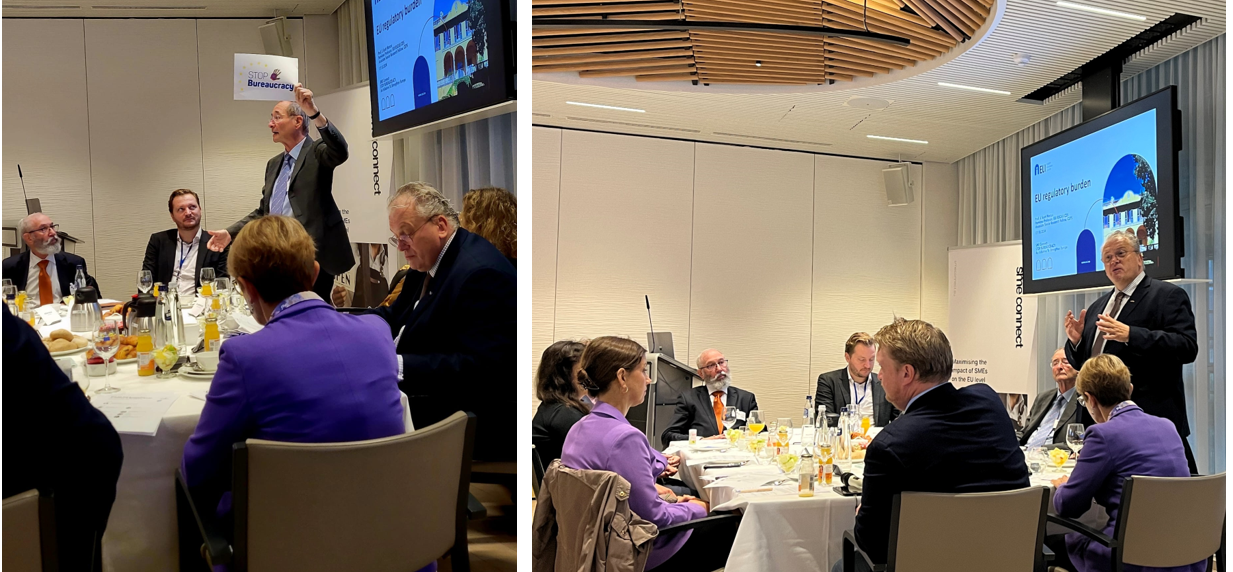
The distinguished speakers then shared their insights:
J. SCOTT MARCUS, Associate Senior Research Fellow at CEPS and Part-time Professor at the Centre for a Digital Society, explained that recent reports highlight the importance of reducing regulatory burdens, especially for SMEs, which are often inadvertently affected by laws designed for larger corporations. Over the past decade, there has been a significant increase in legislation, particularly in digital and sustainability areas, yet the complexities and burdens continue to escalate, posing challenges for businesses of all sizes. Surveys indicate that business regulations are perceived as major impediments to investment, even more so than access to finance. Various initiatives aimed at reducing regulatory complexity have underperformed, often treating simplification as a simple check-box exercise rather than a substantive change. To address these issues, a comprehensive reevaluation of impact assessments, cross-coordination among legislative areas, and a more robust approach to simplifying existing laws is crucial.
PETER DOHR, Senior Expert for Better Regulation at WKÖ EU Representation, presented findings from three surveys conducted in 2024 regarding the regulatory burden on Austrian companies. The first survey, which included 1,000 companies, revealed that 59% felt the time spent on regulatory compliance had increased over the past three years, with 72% of SMEs feeling the impact more acutely. On average, Austrian companies reported spending 9.4 hours weekly on bureaucratic tasks, with solo entrepreneurs averaging 3.9 hours, and SMEs averaging 19.3 hours per week. The second survey focused on the trade and crafts sector, where 71% indicated a rise in bureaucratic burdens, negatively affecting their workload. The third survey highlighted that 41% of 500 industry respondents have shifted parts of their value chain abroad due to rising administrative costs, with 79% stating these costs make the European market less attractive. The increasing regulatory burden is eroding the competitive advantage of Austrian and European businesses, making it more challenging for them to compete with companies from regions with less stringent regulations.
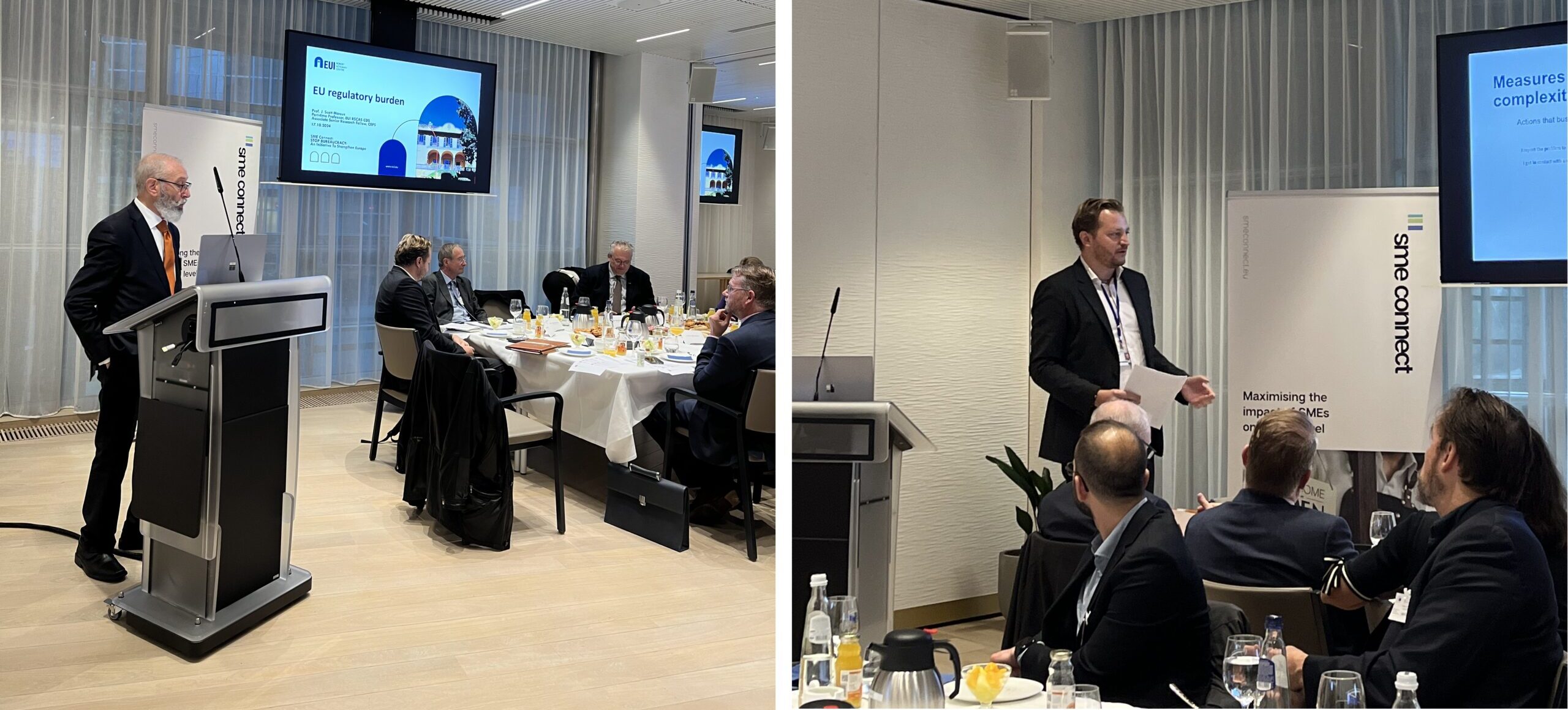
MILENA ANGELOVA, Secretary-General of BICA, Member of EECS, and SME Envoy of Bulgaria, warned of the significant burden that bureaucracy places on companies and jobs. It stifles innovation, delays decision-making, and increases operational costs, often forcing businesses to downsize and lose competitiveness. Between 2017 and 2022, the EU imposed 850 new obligations on companies, increasing the complexity, especially for SMEs involved in supply chains. The EU’s global competitiveness is at risk, and without urgent action to reduce administrative burdens, Europe could fall behind. Studies show the potential to unlock €183-269 billion annually, and the European Parliament estimates that removing single market barriers could release €713 billion by 2029. Swift implementation of a unified European market is key. While businesses manage their own competitiveness, policymakers must do their part by aligning policies to provide a favourable business environment for EU industry.
STEFAN SOLLE, Head of Department International Relations at Gesamtmetall, began with an example, noting that the Conflict Minerals Regulation (2017) mandated the creation of a “White list” of responsible global smelters and refiners. However, even after seven years, this list has yet to be established, as the European Commission has not fulfilled this obligation. Meanwhile, the Corporate Sustainability Due Diligence Directive (CSDDD) demands that companies monitor their entire global supply chains, introducing civil liability – a nearly impossible task for businesses. Legislators often pass rules they themselves cannot enforce. EU legislation increasingly stems from distrust, using misuse by a few companies as the basis for new laws. Instead of authorities tracking compliance, companies bear the burden of proving adherence through extensive reporting requirements, such as in the CSRD and CSDDD. Legislation must return to being based on trust in bona fide companies, making rules simpler to apply and enforce. By doing so, much of the bureaucratic burden could be reduced.
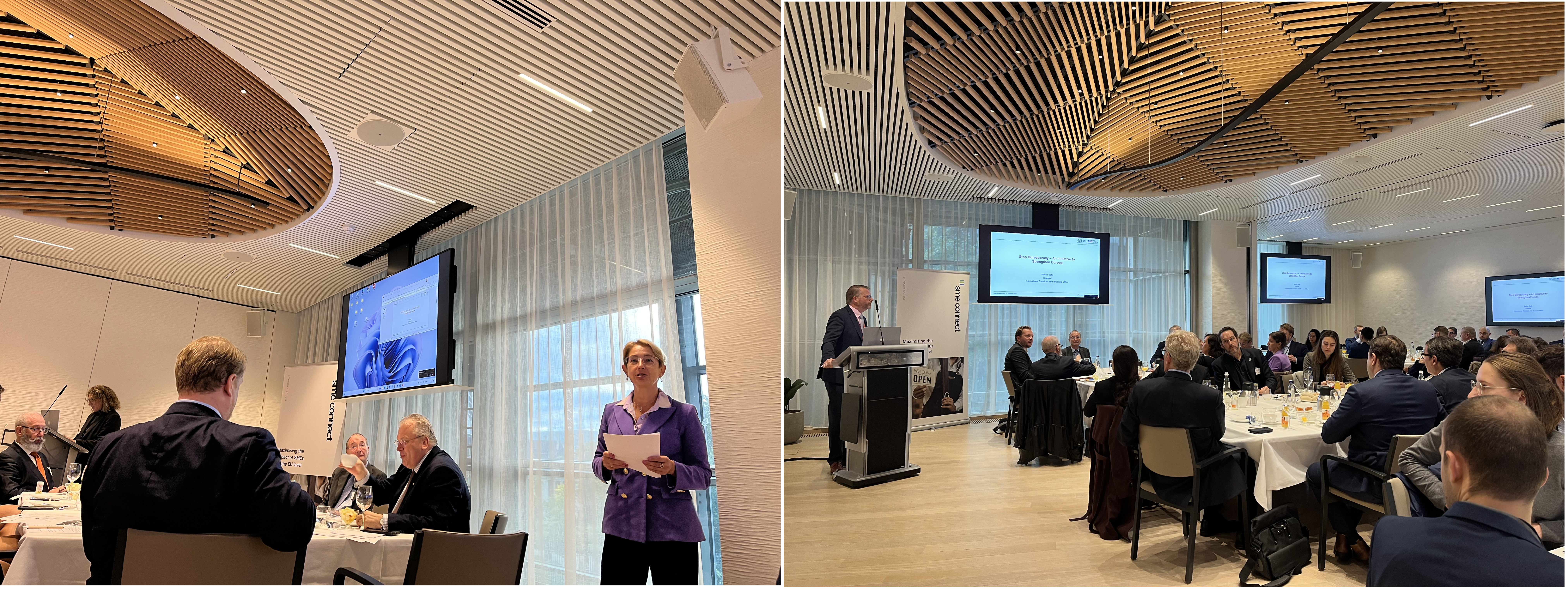
STEFANIE SABET, Managing Director and Head of Office in Brussels for the Federation of German Food and Drink Industries, highlighted the critical role of the German food and drink industry, the second largest in Europe, contributing 17% to the EU’s total turnover and relies heavily on a functioning internal market. To maintain growth and competitiveness, the industry stresses the need for reduced bureaucracy and improved EU legislation. Simplifying sustainability reporting under the CSRD is essential, alongside avoiding additional sector-specific requirements. In terms of supply chains, removing turnover-based limits from the UTP Directive would ease the administrative burden on companies. Harmonizing packaging sorting instructions across the EU and streamlining reporting through a central data point would also reduce complexity. Additionally, easing food labeling through digital solutions (like QR codes), would help businesses, to market products more efficiently across the EU while reducing packaging waste. Reducing red tape in these areas would support innovation, promote sustainable practices, and strengthen competitiveness.
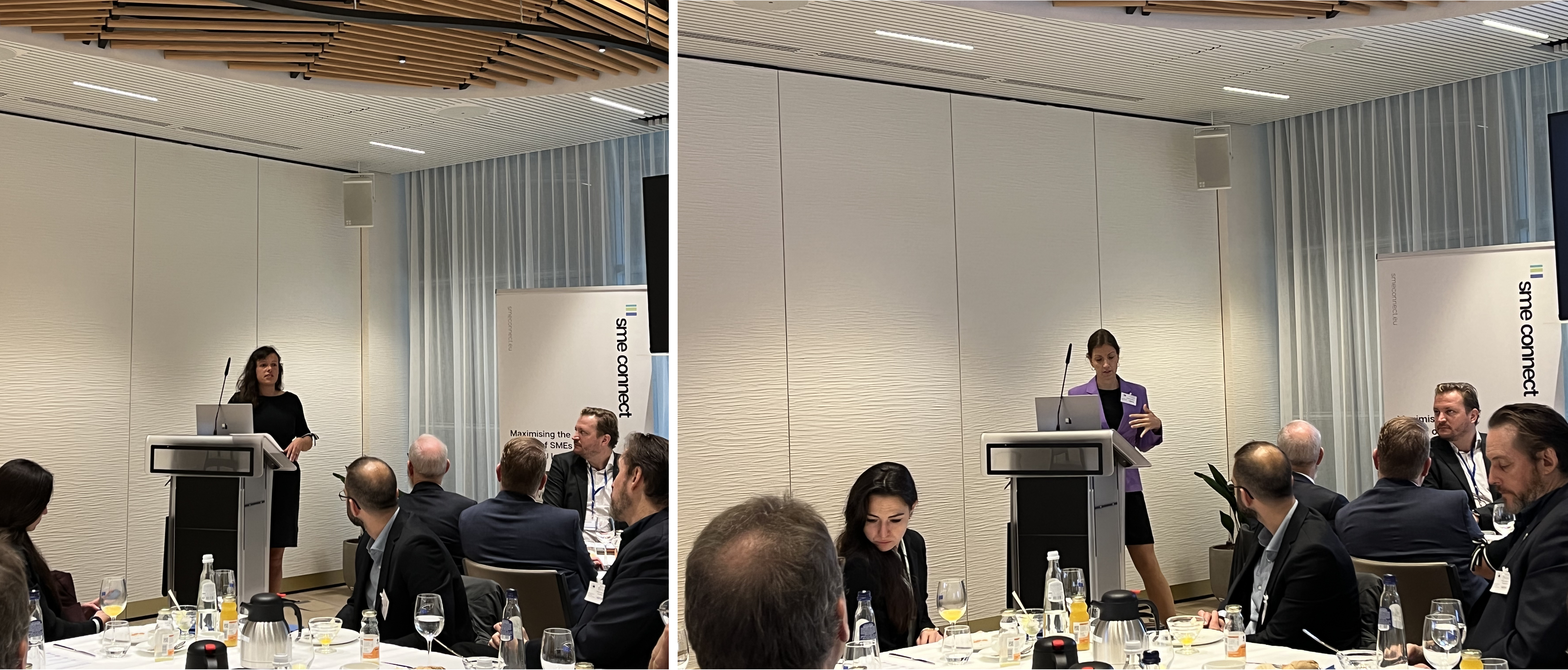
AGATA BOUTANOS, Director of the Representation to the European Union of the Union of Entrepreneurs and Employers (ZPP), in her address, discussed the EU’s two decades of leadership in setting ambitious global standards now face challenges due to geopolitical shifts. She stressed the need to balance regulations with market competitiveness, as over-regulation is hurting innovation, and only four of the top 50 global tech companies are from Europe. She welcomed efforts to simplify EU rules, citing Mario Draghi’s report, which shows Europe has passed four times more legislation than the U.S. since 2019. This regulatory overload, coupled with a lack of focus on economic incentives, particularly in the tech sector, has caused Europe to fall behind the U.S. and China since 2008. Excessive regulation, especially in technology, weakens competitiveness. Simplifying rules, particularly in AI, could boost innovation while protecting data. She also emphasized that fair access to the EU Single Market and opening it up for smaller member states, along with better transatlantic cooperation in technology and energy, are essential for growth.
In closing, the moderator, HORST HEITZ, Chair of the Steering Committee at SME Connect, rallied participants to join the Stop Bureaucracy initiative, inviting everyone to sign and actively support the cause. He encouraged those interested to connect with SME Connect for an introduction to the Taxpayers Association of Europe (TAE) or to reach out to TAE directly. Furthermore, Heitz appealed to the audience to share real-world examples of excessive bureaucracy, as TAE is compiling a „Black Book on Bureaucracy“ to expose and address these regulatory barriers. He called on the business community to be active and make a difference – because the idea of Europe must remain a success story.